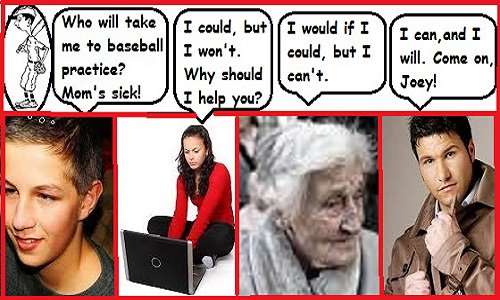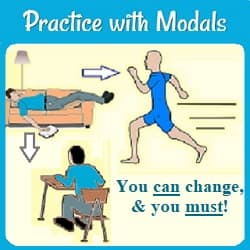Modal Verbs and their Uses
Modal verbs are helping verbs that show various levels of certainty, possibility, or duty. There are three rules that make them different from regular verbs or other helping verbs.
- Modal verbs have only one form. (They do not change for person or tense).
- The verbs that immediately follow them are always in the base form, even for third person singular or in the past. (This is also true of ‘do,’ but not of other helping verbs.)
- Modals cannot be used alone (without a main verb) in a sentence, except in short answers: “Can you see him?” ”Yes, I can.” “Should I call him?” “No, you shouldn’t.”
The Common Modals (Affirmative and
Negative) Are:
 Conversation using modal verbs
Conversation using modal verbs- can, can’t,
- could, couldn’t,
- will, won’t,
- would, wouldn’t,
- should, shouldn’t,
- ought to, ought not (to),
- must, must not,
- may, may not,
- might, might not
Uses and Meanings of Different Modal Verbs
Can and Could
‘Can’ tells what is possible.
- Newborn babies can't do much besides eat and sleep. By the time they are about one year old, children have learned to crawl, then to walk, and to say a few words. Before long toddlers can climb, run, and say whatever they need to say.
‘Could’ tells what was possible in the past. (When I was young, I could run fast, but now I can’t.)
'Could' is also often used like ’might’ to express limited probability, and as a polite way of requesting help or permission. Examples:
- Could you please open the door?
- Could I have next Friday off? (‘Can’ is also sometimes used to request help or permission, but it is not quite so polite. ‘May’ is the most proper form for asking permission.)
Will and Would
We use ‘will’ (or ‘be going to’-- not a modal verb) to talk about the future. ‘Will’ can also express determination.
It is often shortened to -‘ll.“He’ll go tomorrow, but she won’t.” (Won't is the negative contraction-- will+ not.) When ordering at a restaurant: “I’ll have the roast beef with mashed potatoes, please.” (You could also say, “I’d like the roast beef,” or “Could I have the toast beef, please?”)
See Practice the Future Tense for more on will and won't.
We use ‘would’ (or its contraction: -‘d) as shown above, for making polite requests:
-- Sue: “Would you like some more fish?”
-- Mary: “Thanks, but I’d rather have some ice cream now.”
(I’d is the contracted form of ‘I would.’ We also use you’d, he’d, she’d, it’d, we’d, and they’d:
-- “You’d like my brother if you could meet him. I think he’d like you, too. Maybe you can come home with me this summer. It’d be great for you to meet my family, and I’m sure they’d be thrilled to have you. We’d have a fantastic time!”)
We also use ‘would’ when our action depends on certain conditions. There are several conditional forms. You can say, “I will go if it doesn’t rain,” or “I would go, but I think it’s going to rain” (which means that in fact you won’t go).
You could also say, “If I won a million dollars, I ‘d travel around the world” (an imaginary or ‘unreal conditional’. You probably won’t win the money, so you won’t travel. Note that the verb after ‘if’ here is in the past tense form, even though you’re talking about the future.That’s the correct form for the unreal conditional tense. It makes it clear that this is a very unlikely event.)
You can also use ‘would’ with a conditional (if) clause in the past perfect to talk about how things might be different now if the past had been different.
- “If you had been watching, you wouldn’t have hit that car.”
- “If I had studied harder, I would (or might, or could) have gotten into Harvard.” However, you didn’t study hard enough, so you didn’t get accepted.
There is a discussion of different conditional forms, with more examples, in Conditional Sentence Examples.
Should, Ought to, & Must
We use ‘should’ and ‘ought to’ to give advice or to express duty.
- “I should (or ought to) do my homework, but I think I’ll watch the game instead.”
- “You really shouldn’t smoke. It might kill you early!”
- “Do you think I should go out with Chris tonight?”
- “Well, you really ought to stay home and finish packing instead.”
‘Must’ indicates an action that is not optional: you have to do it. We use it for laws and inescapable duties or facts of life:
- “We all must die sometime.”
- “In the U.S. people that receive tips must report them on their income tax forms.”
‘Must not’ expresses the same urgent obligation.
- “You must not enter that compound! They’ll shoot you!”
- “Pedestrians must not cross the street when the traffic light facing them is red. They must wait for a green light.”
‘Must not’ is very different from ‘don’t have to,’ which means that an action is not required (but is permitted.)
- “In our family, children under 10 must go to bed at 9 o’clock, but the teenagers don’t have to go to bed until 11 on weeknights, or even later on Friday and Saturday nights .”
There is more on 'should,' 'ought to.' 'must,' and other modals on Practice Giving Advice.
May, Might, & Shall
‘May’ is the correct modal to ask for permission (though ’could’ is also polite and ‘can’ is used quite often, especially by children.) ‘May’ also expresses limited probability.
‘Might’ suggests that something is unlikely, but possible. “It may rain tomorrow” means maybe it will rain-- I don’t really know. “It might rain” can mean the same thing, but suggests it is more likely that it won’t rain.
There is one more rarely-used modal verb: shall and shall not or shan’t.
In the past, shall was used for the first person future instead of will-- or they might be reversed to express very strong determination: (“You shall not die!” he cried. “I will not let it happen!”)
Shall is not used very commonly anymore except as an invitation or suggestion: “Shall we dance?” (Even then, “let’s dance” is more common, at least in the U.S.)
For more information on using modal verbs, see English Verbs, Negative Sentences,and Question Formation. To practice them, see Modals Practice.
home>English Grammar Lessons>Modal Verbs.
Didn't find what you
needed? Explain what you want in the search box below.
(For example, cognates, past tense practice, or 'get along with.') Click to see the related pages on EnglishHints.
| site search by freefind | advanced |







New! Comments
What do you think about what you just read? Leave me a comment in the box below.